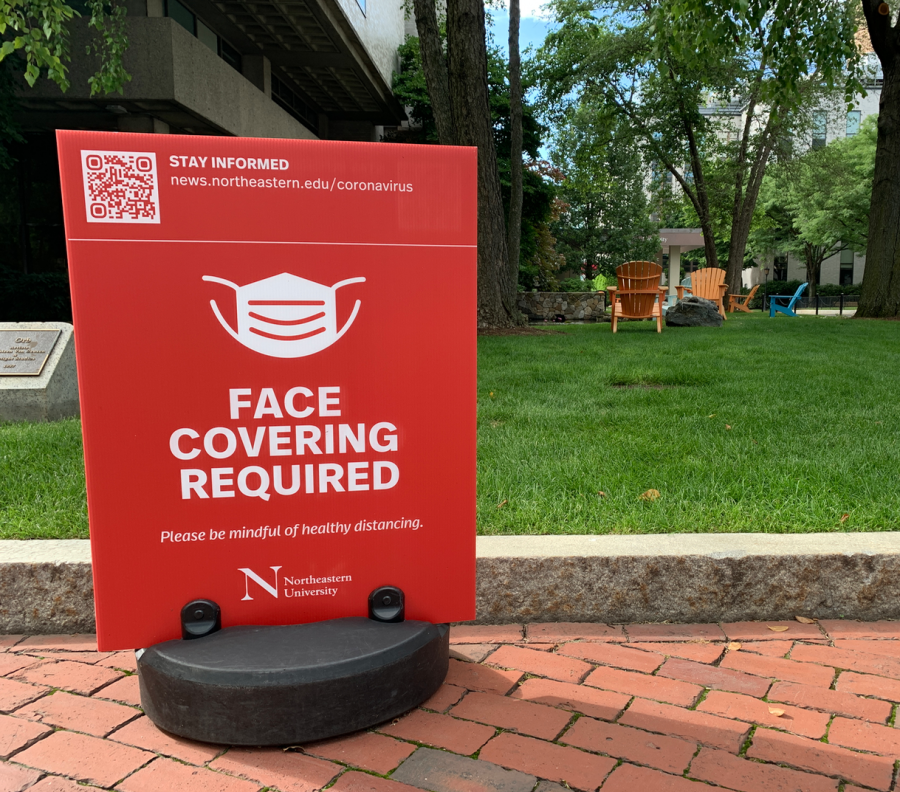Op-ed: The “New Normal” at Northeastern fails to consider one thing
Northeastern’s COVID-19 guidelines are not taking into account the sex lives of students.
February 1, 2021
An update from Provost and Senior Vice President for Academic Affairs David Madigan regarding COVID-19 policies for the Spring 2021 semester at Northeastern opens with the statement, “Working together this semester we successfully reimagined almost every aspect of university life — from teaching to dining to recreation.” The keyword here is “almost.” All official statements about adapting to the public health crisis on campus have avoided the elephant in the room: The sex life of students.
College is often regarded as a place where young adults have sexual freedom, and this sentiment will not be erased amidst a pandemic. Northeastern’s COVID-19 policies that ignore sex and dating in student life jeopardize the health of the Northeastern community.
Harm reduction strategies have been proven to be more effective at reducing adverse consequences associated with substance abuse and sex than promoting abstinence, particularly in adolescents. The philosophy of harm reduction involves accepting the continuation of a certain behavior and providing resources to lower the potential risks when the behavior does occur.
While COVID-19 is not classified as a sexually transmitted disease, we know the spread of infection through sexual contact is highly likely. The virus is not going away anytime soon, so Northeastern should implement the harm reduction philosophy to promote safer sex practices during the pandemic. This is a more effective and sustainable option than expecting students to abstain from sex. While the university encourages harm reduction strategies for safe socialization — through outdoor, socially-distant hangouts with masks or in a virtual setting — Northeastern offers no adaptations for physical intimacy which can be just as important for mental health as interacting with friends.
The update to Northeastern’s visitor protocol prohibits any guests in student housing. Sanctions for attending or hosting unsafe gatherings (defined as lacking masks and not staying six feet apart at all times) both on and off campus include suspension and/or expulsion. The university is not explicitly saying “do not have sex,” but to fully comply with the rules as stated, sex is not an option.
With the school’s urban location and a national spike in dating app usage, however, these rules do not stop students from secretly engaging in sexual activity off campus where the policies cannot be enforced. Therefore, if students will continue to have sex anyway, and Northeastern is committed to “protecting the pack,” the school has a responsibility to inform students on how to be as safe as possible if they choose to be physically intimate with a partner.
This resource from the Office of Prevention and Education at Northeastern, or OPEN, provides information on how to navigate safer sex during the pandemic, including where you can get free sexual health supplies and how to talk to a sexual partner about one’s boundaries related to COVID-19. However, I believe it is not a mistake that this resource was hard to find and not linked anywhere in Northeastern’s main communications with students. COVID-19 related conversations will never be sexy, but an upfront, open dialogue about sex and health concerns from the university would normalize their neccessity.
Another troubling consequence of Northeastern’s lack of consideration for the sex life of students is that those who choose to be sexually active during this time will avoid seeking medical care that is crucial for their health. For some students, Northeastern is their only resource for sexual health resources such as contraception and STI testing. When most instances of sexual activity go against Northeastern’s COVID-19 policies, students can be deterred from turning to the University Health and Counseling Services out of fear of punishment.
Some may argue that a school should have no say in private matters like a student’s sex life, but Northeastern’s existing policies already control how students conduct themselves everyday. So why is sexuality left out of the conversation? I admittedly would feel awkward if Provost Madigan addressed sex in an official capacity, but that is simply because it is expected that educational institutions hold conservative values when it comes to sex. Northeastern’s silence on sex as a part of social life is a reflection of the Protestant framework of morality that governs public life in the United States. At the very least, in the context of the COVID-19 pandemic, sex becomes a public matter with relevant health consequences.
No one will die from abstaining from sex for a year, or however long being sexually active during the pandemic is seen as a selfish choice that puts the lives of others at risk. However, no one passes moral judgement on those who prefer to attend in-person classes even though it still involves potential risks, and online learning is another viable alternative. Universities can and should play an active role in reimagining a sex-positive society. That involves looking the elephant in the eye by adjusting policies to reflect a harm reduction approach to sex, just as universities do for every other part of student life.
Jasmine Chan is a recently graduated Media & Screen Studies and Communications combined major. She can be reached at chan.jas@northeastern.edu.







